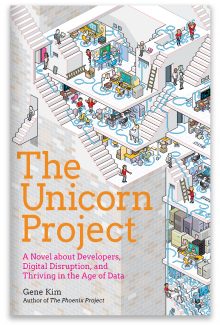
2020-02-24
The Unicorn Project (TUP from here on) was our most recent “project” in the book club at work. It was my suggestion, I had preordered it when I first saw it, and I had very high hopes for it—The Phoenix Project (TPP) had been our first book club book, and it was a big success, both in terms of being interesting and drawing a good sized crowd to the book club meetings.

We even followed up TPP with Accelerate, and I’m pretty sure the overall awareness of the importance (or existence?) of DevOps at the company improved as a consequence.
TUP, however, didn’t quite live up to the great expectations we had. This manifested itself in a group size that was down to the size of three by the time we finished, from an initial count of about ten. And it wasn’t because the book was dense or a difficult read, that much is for sure.
Quite the opposite, actually. Sure, TPP had fluff, but it was entertaining fluff, and there was a core with quite some substance to it: The Three Ways, and a long list of interesting references to get deeper into the topic. TUP, on the other hand, turned out to be almost exclusively fluff. Yes, there were The Five Ideals, and I’m not sure why they seemed so much less insightful than The Three Ways, but I had this strong sense of “duh, that’s obvious” for much of the time.
Functional programming is presented as the cure-all for software engineering that probably is going to make Fred Brooks rewrite his famous essay any moment now. When the story’s heroine Maxine sits down and rewrites that pesky 2000 line “order fulfillment module” over her lunch break in Clojure—after having fixed it in a single morning first, no less—the eyeroll is certainly strong in me.
If I wanted to be mean, I’d say the book is a 300 page prelude to a list of references containing the meaty stuff. But that wouldn’t be quite fair. I feel the book has entertainment value even without being super insightful or instructive, and there really aren’t that many novels written about software engineering that don’t go overboard with the clichés. Not that TUP doesn’t have a few, uh, “stereotypical” personalities—but all in all, it seems to have been written by somebody who knows what they’re talking about, and I don’t consider my time reading it has been wasted.
Even if Clojure isn’t going to cure cancer.